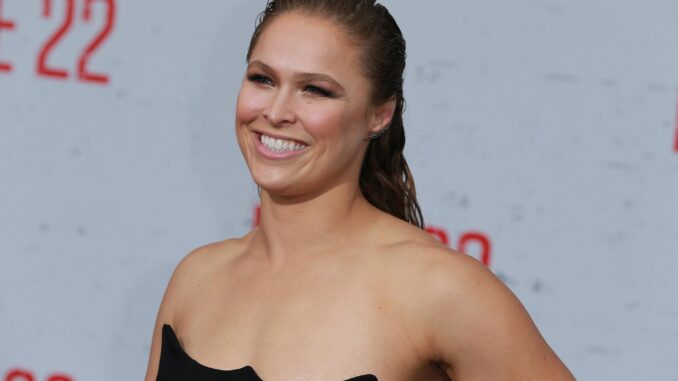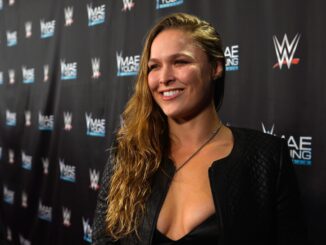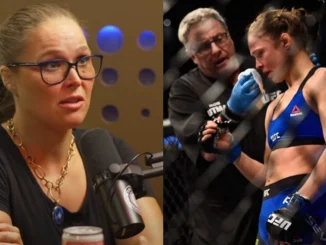

Ronda Rousey sits in silence on the cold concrete floor of the Marvel Stadium medical room in Melbourne, Australia.
There are tears running down her cheeks. She is shivering, covered in sweat and can taste blood in her mouth. Outside, Rousey can hear laughter and tens of thousands of cheering fans.
It is November 2015 and Rousey has just lost her UFC bantamweight title via a chastening head-kick knockout by fellow American Holly Holm.
Her coaching team surround her, solemn, their heads lowered. In the middle of it all, Rousey’s mind is a swirl of suicidal thoughts and the most “intense pain, misery, embarrassment and shame” she has ever felt.
It is an experience Rousey, 37, describes in her new book Our Fight as “the worst moment of the worst day” of her life.
But amid the desolation, Rousey hears eight words from her husband-to-be Travis Browne which will change the course of her life:
“You are so much more than a fighter.”
Rousey didn’t believe him at the time. Now she can look back, nine years on, and appreciate the meaning behind those words.
In a wide-ranging interview with BBC Sport in New York, Rousey reveals how she climbed out of a dark place to find fulfilment in her life outside fighting.
But to understand Rousey, you have to follow the route down to her lowest point.
Rousey flicks her head around as she remembers her first day fighting – 26 years ago.
“I didn’t have a hair tie, so my hair was going all over the place and crazy,” she says, swinging her ponytail to mimic the moment she first tried judo.
“I remember I got off the mat and Blinky [Richard Elizalde], my first coach, said: ‘It’s a lot more fun than swimming isn’t it?'”
“And having her just walk through the living room made it feel so much more attainable for me to want to do just as much, even more.”
Rousey would narrowly miss out on her dream of winning Olympic gold in judo, taking bronze at the 2008 Beijing Olympics, but glory and fame would follow in the next stage of her career as she transitioned to mixed martial arts.
She tore though the professional ranks, winning her first 12 bouts, 11 of those victories coming in the first round. In doing so, she captured the UFC bantamweight title and a mainstream audience, elevating MMA into the public consciousness.
Fans weren’t drawn in just by the dominant nature of Rousey’s performances, where typically she would utilise her judo background in taking opponents down before submitting them via armbar. It was the bravado she brought too.
“I felt like women’s combat sports was missing showmanship,” says Rousey.
“A lot of times when women are coming to a space where they’re not entirely welcome, they try to make as few waves as possible. I needed to make as many as possible in order to fight for our place there, instead of politely asking for permission for it.”
Rousey (left) didn’t fight for a year after Holm delivered a sensational knockout victory
She remains the most popular female athlete on Instagram, with her 17.5 million-strong following eclipsing even that of tennis’ Serena Williams.
But her rise to UFC superstardom may never have happened if Rousey’s charisma and clinical style hadn’t forced the promotion’s president Dana White to change his mind. In January 2011, White confidently declared women would “never” fight in his organisation., external Less than two years later, he signed Rousey as UFC’s first female athlete.
Rousey took White’s initial opinion as a “personal challenge”.
“When I first saw [White’s interview], my first thought was ‘oh well, he hasn’t met me yet’,” she says.
“It just felt like a matter of time before our paths would cross and I changed his mind.”
Rousey explains why creating spaces for women in male-dominated circles has been important to her throughout her career.
“Oh, I think it comes from being a woman that’s amazing at something,” Rousey says with a wry smile.
“You have to work twice as hard and do twice as much to get half the respect.
“You have a right to be there. And sometimes when you’re the only woman in the room, it’s easy to not feel like that, to feel out of place. But you are in your place – you don’t need to shrink and to try and fit in the little spaces. You’re allowed to spread out and to take the space that you deserve.”
Rousey (in blue) competed as a teenager at the Athens Olympics in 2004, before taking bronze in Beijing four years later
On the upper floors of the prestigious New York Athletic Club on the fringes of Central Park – where this interview is taking place – there is a hall of fame celebrating its members’ sporting successes.
Among the rows of trophies, and the black-and-white images of triumphant athletes, hangs a portrait of a 21-year-old Rousey following her Olympic bronze success in 2008.
The 2024 version of Rousey enters the room wearing a white tunic and a superstar aura. But for every sprinkle of stardust there are also moments of profound vulnerability and splashes of self-deprecating humour.
After coming third at Beijing 2008, Rousey’s aim was to translate her success into enough money to buy her first car. Now she and her husband own a ranch in Oregon comprising just less than 4,000 acres.
Rousey became a gardener during one of her darkest periods.
Her harrowing defeat by Holm was followed by a first-round stoppage defeat by Amanda Nunes and immediate retirement from MMA.
She had gone from apparent invincibility – a 2015 Washington Post article described her as “too good” for her own sport, external – to sudden ignominy in little more than a year.
Rousey became depressed.
“It wasn’t easy. It took a lot of time, chocolate crepes, weed, World of Warcraft, and then love and kisses from my husband and patience from my family to get through it,” says Rousey.
After some words of encouragement from Browne, Rousey decided to start gardening.
“I was really excited when I finally got a plant to grow, but then it was immediately eaten by a squirrel,” laughs Rousey.
“So the next time I got a little sprout, I built a little Fort Knox around it. And, for the first time, I focused on where I’d succeeded instead of where I’d failed.
“Not everything is the Olympic finals. But I’d been treating my whole life as if it was since I was six and it was hard to break out of it.”
Rousey practices regenerative agriculture, which produces environmental benefits as well as food.
When Rousey describes the ranch, which is called Browsey Acres, her eyes light up and she talks a little faster.
“I think regenerative agriculture is one of the most scalable solutions to climate change that’s out there right now,” says Rousey.
“Our animals are being treated humanely and are able to exhibit natural behaviours. It just feels like being part of the solution, when so much of the world around us feels like a problem.”
In 2021, Rousey became a mother for the first time, giving birth to her daughter Po.
It has clarified what really matters going forward.
“We’re trying to leave solutions for our kids and not just a pile of money that’s lit on fire,” says Rousey.
“We’re trying to address these crises that she’s inevitably going to have to face in her lifetime like climate change. It’s something that really weighs on my worries for my children in the future.
“This is basically the war effort of our time, and what deserves all of our time and energy, because every single bit that we put into it is us putting into our children.”
Rousey is a regular on the chat-show circuit, but prefers a more rural existence on her farm
Before the interview starts, Rousey reveals she has been pleasantly surprised by the positive reaction to her new book. Part of her had expected a negative response.
She is used to adversity. She has been scrutinised intensely by media and fans throughout her career, from her early days as a judoka through to her most recent stint as a wrestler in the WWE.
“It really feels like everyone’s always going to define me by my failures, but I know that I created the most efficient fighting style that ever existed and I’m proud of that,” says Rousey.
Critics have long pointed to Rousey’s difficulty in accepting defeat and her refusal to credit opponents who have beaten her, such as Holm and Nunes.
Rousey admits it’s something she has always struggled with, comparing the sensation of defeat to grief.
“Ever since I was a little kid I had a huge problem with it. I lost my first junior nationals when I locked myself in my bedroom and cried for a week. I was 13 years old,” she says.
But Rousey’s hatred of defeat is also what fuelled her victories, with her mother encouraging her to use it as a “weapon”.
“One of the advantages I had over the other girls was that when I was fighting, I wanted it more than them. And I think one thing that’s required in order to be a special champion is you have to be willing to get your heart broken,” says Rousey.
“I think that’s one thing that made me great, because I was willing to get my heart broken over and over and over again and not allow myself to stop caring as much as others did.”
Rousey has always fought strongly for her beliefs. It is a trait that defined her five-year stint in professional wrestling promotion WWE.
She describes frustrations at women’s matches being cut shorter in favour of men’s and a lack of planning and preparation time.
“Initially I wanted to do something that was just for fun, that wasn’t competition and just have a good time with my girlfriends,” she says
“But that kind of got hijacked by the whole women’s Evolution [a landmark all-women event headlined by Rousey in October 2018] and trying to accomplish all of these things.
“The WWE were so entrenched in doing things that they’ve always done, that they just wanted to be left alone to be good enough.”
Rousey’s WWE stint could serve as a metaphor for her entire career.
“I was like ‘I can’t be associated with mediocrity’. I can’t stay here and just be good enough,” she adds.
Despite WWE’s expansion of its female roster and its appointment of women to prominent roles behind the scenes, Rousey left the organisation last year. BBC Sport has approached the WWE for comment.
Before the interviews ends, Rousey is asked what comes next, which she answers with a beaming smile.
“I feel like I’ve learned so much from judo, UFC and pro wrestling, that I would love to be the next Bruce Lee,” says Rousey.
“I don’t know if it’s ever gonna come along, but also nobody wrote Enter the Dragon and had it handed to them – they had go out there and make it happen. So maybe I’ll do something similar one day.
“Or maybe, you know, I’ll just be chilling with my cows.”
Maybe, but ‘just chilling’ would be the most dramatic career change of all for Rousey.



Be the first to comment